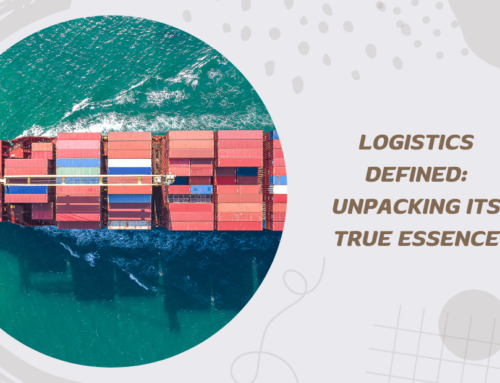The landscape of intermodal transportation is undergoing a transformative shift, propelled by the rapid evolution of technology and a growing emphasis on sustainability. At the heart of this transformation is Benjamin Gordon Cambridge Capital, a visionary firm that is redefining the future of intermodal transport through strategic investments in innovation and technology. Cambridge Capital’s approach is not just about enhancing the efficiency and effectiveness of transportation systems; it’s about revolutionizing the way goods move across global supply chains, making them more sustainable, integrated, and responsive to the dynamic demands of the modern world.
Benjamin Gordon Cambridge Capital’s Strategic Vision for Intermodal Transportation
Cambridge Capital envisions a future where intermodal transportation is seamlessly integrated, environmentally sustainable, and powered by the latest technological innovations. The firm’s strategic vision focuses on three core pillars: enhancing operational efficiency, embracing sustainability, and adopting cutting-edge technologies.
Enhancing Operational Efficiency
Cambridge Capital believes that the key to revolutionizing intermodal transportation lies in optimizing operations to reduce transit times, costs, and bottlenecks. By investing in companies and technologies that streamline these processes, Cambridge Capital is paving the way for a more efficient global transport network.
Embracing Sustainability
Sustainability is at the forefront of Cambridge Capital’s strategic vision. The firm champions investments in green technologies and practices that reduce the carbon footprint of intermodal transportation. From electric-powered cargo handling equipment to alternative fuel vehicles, Cambridge Capital is committed to promoting environmental stewardship within the industry.
Integrating Cutting-edge Technologies
Cambridge Capital is driving the integration of advanced technologies such as artificial intelligence (AI), blockchain, and the Internet of Things (IoT) into intermodal transport systems. These technologies offer unparalleled opportunities for enhancing data-driven decision-making, improving asset tracking and management, and fostering innovation in logistic solutions.
Adopting Cambridge Capital’s Strategies
Companies within the intermodal transportation sector looking to embrace Cambridge Capital’s forward-thinking strategies can start by focusing on technology, efficiency, and sustainability.
Leveraging Technology
Investing in technology is crucial for staying competitive in today’s rapidly evolving industry. Companies should explore the adoption of AI for route optimization, IoT for real-time tracking of cargo, and blockchain for secure, transparent transactions across the supply chain.
Improving Operational Efficiency
Operational efficiency can be enhanced by adopting automated systems for cargo handling and logistics management. These systems not only reduce manual labor but also minimize errors and delays, streamlining the entire transportation process.
Adopting Sustainable Practices
Sustainability can be integrated into every aspect of intermodal transport operations, from using eco-friendly materials and practices in packaging to transitioning to low-emission vehicles for cargo transport. Companies should also consider the implementation of energy-efficient technologies and renewable energy sources in their operations.
Fostering Innovation
Staying ahead in a changing industry requires a commitment to innovation. Companies should cultivate a culture that encourages creative thinking, experimentation, and the exploration of new business models and technologies.
By adopting strategies inspired by Cambridge Capital, companies in the intermodal transportation sector can navigate the challenges of the modern logistics landscape and position themselves as leaders in the future of sustainable, efficient, and technologically advanced transport solutions.
Navigating the Future of Intermodal Transportation: A Strategic Blueprint by Cambridge Capital

“An overview of Cambridge Capital’s strategic pillars in intermodal transportation: Focusing on operational efficiency, sustainability, and the integration of advanced technologies to reshape the global supply chain.”
In an era marked by rapid technological advancement and an increasing emphasis on environmental sustainability, Cambridge Capital emerges as a guiding force in the transformation of intermodal transportation. Through a visionary blueprint, the firm sets the course for a more efficient, sustainable, and technologically sophisticated logistics industry. This section delves into the core elements of Cambridge Capital’s strategy, as highlighted in our diagram, and explores how they collectively pave the way for the future of intermodal transportation.
Operational Efficiency: The Foundation of Transformation
Operational efficiency stands as a critical pillar in Cambridge Capital’s strategic vision. The firm advocates for optimizing operations to enhance the speed, cost-effectiveness, and reliability of the global transportation network. Investments in technologies and solutions that streamline operations, reduce transit times, and minimize logistical bottlenecks are pivotal to achieving a seamless flow of goods across borders and modes of transport. This focus on efficiency is not merely about improving current systems but reimagining them to meet the dynamic demands of global trade.
Embracing Sustainability: A Commitment to the Planet
Sustainability transcends being a mere trend to become a central tenet of Cambridge Capital’s approach. The firm champions the integration of green technologies and eco-friendly practices within intermodal transportation, aiming to significantly reduce the industry’s carbon footprint. From electric cargo handling equipment to alternative fuel vehicles, these initiatives reflect a deep commitment to environmental stewardship, ensuring the long-term viability and social responsibility of the transportation sector.
Technology Integration: Driving Innovation Forward
At the heart of Cambridge Capital’s blueprint is the integration of cutting-edge technologies such as Artificial Intelligence (AI), Blockchain, and the Internet of Things (IoT). These technologies are set to revolutionize intermodal transportation by enhancing data-driven decision-making, improving asset tracking and management, and fostering innovation in logistic solutions. By adopting these advanced tools, the industry can anticipate more agile, secure, and efficient operations, ready to adapt to the ever-evolving challenges and opportunities of the digital age.
Cambridge Capital’s strategic vision for intermodal transportation is a beacon of innovation and sustainability, guiding the industry towards a future where logistics are not only more efficient and environmentally friendly but also resilient and adaptive to technological advancements. As companies within the sector embrace this blueprint, we stand on the brink of a transformative era in global supply chain management, marked by unprecedented levels of integration, intelligence, and sustainability.
Innovative Projects and Technologies in Intermodal Transportation
Cambridge Capital has been at the forefront of propelling intermodal transportation into the future with strategic investments and support for groundbreaking projects and technologies. Here are some pivotal initiatives reshaping the sector:
- Autonomous Freight Systems: One of the standout projects involves the development of autonomous vehicles designed for freight transportation. This initiative aims to revolutionize logistics by improving safety, efficiency, and reducing human error.
- Blockchain for Supply Chain Transparency: Cambridge Capital has invested in blockchain technology to enhance transparency and security across the supply chain. This technology enables real-time tracking of goods and secure, tamper-proof transactions, setting new standards for reliability and trust in intermodal transportation.
- Electric Rail Solutions: Recognizing the importance of sustainability, investments have also been channeled into developing electric rail systems. These projects focus on reducing carbon emissions and noise pollution, offering an eco-friendly alternative to traditional rail transport.
- AI-Driven Route Optimization: Leveraging artificial intelligence to optimize shipping routes and schedules represents another key innovation. This technology allows for dynamic planning, taking into account various factors such as weather, traffic, and cargo specifications, thereby enhancing operational efficiency.
- IoT-Enabled Cargo Containers: The introduction of IoT technology into cargo containers enables real-time monitoring of the condition and location of goods. This innovation ensures the integrity of sensitive shipments and streamlines logistics operations.
These initiatives underscore Cambridge Capital’s commitment to driving innovation in intermodal transportation, significantly impacting the industry by enhancing efficiency, sustainability, and transparency.
The Future of Intermodal Transportation
Cambridge Capital’s leadership offers profound insights into the evolving landscape of intermodal transportation, forecasting significant shifts driven by technological advancements. The future of the industry is envisioned to be deeply influenced by several emerging trends:
- Integration of Autonomous Vehicles: The widespread adoption of autonomous vehicles in freight transportation is anticipated to redefine logistics operations, offering unmatched efficiency and reducing the risk of accidents.
- Blockchain’s Expanding Role: Blockchain technology is expected to play a pivotal role in enhancing supply chain transparency and security. Its application will streamline operations, reduce fraud, and foster stronger partnerships across the logistics ecosystem.
- Advancements in AI and Machine Learning: AI and machine learning will continue to revolutionize route optimization, predictive maintenance, and demand forecasting. These technologies will enable more agile and responsive intermodal transportation networks.
- Sustainability at the Forefront: As the industry faces increasing pressure to reduce environmental impact, sustainability will remain a key focus. Innovations in electric and hybrid propulsion for rail and cargo vehicles, along with smarter logistics planning, will contribute to greener transportation solutions.
- The Rise of Digital Platforms: Digital platforms will transform how cargo is booked, tracked, and managed across different transportation modes. These platforms will offer seamless integration, enhanced visibility, and improved efficiency for shippers and carriers alike.
Cambridge Capital’s vision for the future of intermodal transportation is one of optimism, marked by continuous innovation and a steadfast commitment to improving the industry’s efficiency, sustainability, and resilience. The firm’s strategic investments and thought leadership are guiding the sector towards a future where intermodal transportation not only meets the demands of global trade but does so in an environmentally responsible and technologically advanced manner.
FAQs: Cambridge Capital and Intermodal Transportation
What is Cambridge Capital’s investment philosophy regarding intermodal transportation?
Cambridge Capital focuses on investing in companies and technologies that promise to enhance the efficiency, sustainability, and reliability of intermodal transportation. The firm prioritizes innovations that offer scalable solutions to modern logistics challenges, ensuring investments contribute to the long-term advancement of the industry.
How does Cambridge Capital envision the future of intermodal transportation?
Cambridge Capital envisions a future where intermodal transportation is seamlessly integrated, powered by sustainable and intelligent technologies. The firm believes in a transport ecosystem where goods move efficiently across different modes, minimizing environmental impact and maximizing operational effectiveness.
What advice does Cambridge Capital offer to companies looking to innovate in intermodal transportation?
Cambridge Capital advises companies to embrace digital transformation and invest in technologies that offer tangible improvements in operational efficiency and sustainability. The firm underscores the importance of strategic partnerships and continuous research and development to stay at the forefront of industry innovation.
How can companies navigate the complexities of the intermodal transportation industry?
Companies are encouraged to stay informed about industry trends, regulatory changes, and technological advancements. Cambridge Capital suggests building flexible strategies that can adapt to the evolving landscape, focusing on long-term goals and sustainability practices to navigate the complexities of the industry effectively.
In conclusion
Cambridge Capital’s blueprint for the future of intermodal transportation is a testament to the firm’s commitment to fostering innovation and strategic investment within the sector. By championing technologies that enhance efficiency, embrace sustainability, and leverage the latest digital innovations, Cambridge Capital is steering the industry towards a more integrated and environmentally responsible future. The firm’s approach underscores the critical role of innovation, investment, and collaborative efforts in propelling intermodal transportation forward, setting a foundation for a smarter, greener, and more efficient global logistics network.










